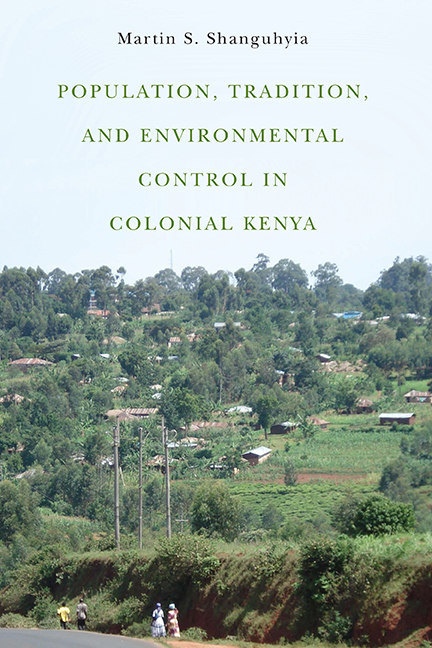Book contents
- Frontmatter
- Contents
- List of Illustrations
- Preface
- Abbreviations
- Introduction
- 1 Administrative and Demographic Changes: Implications on Land Relations, 1900–1930
- 2 Maize and Economic Prosperity, 1920–38
- 3 Internationalizing Degradation Narratives in Kenya, 1930–38
- 4 Prewar Soil Conservation Initiatives and Local Responses, 1934–38
- 5 Wartime Production in a Besieged Environment, 1939–45
- 6 Postwar Development and the Dilemma of “Reviving” African Traditions, 1945–63
- 7 Regional Migration and Failed Agricultural Intensification, 1940–66
- Conclusion
- Notes
- Bibliography
- Index
4 - Prewar Soil Conservation Initiatives and Local Responses, 1934–38
Published online by Cambridge University Press: 09 June 2021
- Frontmatter
- Contents
- List of Illustrations
- Preface
- Abbreviations
- Introduction
- 1 Administrative and Demographic Changes: Implications on Land Relations, 1900–1930
- 2 Maize and Economic Prosperity, 1920–38
- 3 Internationalizing Degradation Narratives in Kenya, 1930–38
- 4 Prewar Soil Conservation Initiatives and Local Responses, 1934–38
- 5 Wartime Production in a Besieged Environment, 1939–45
- 6 Postwar Development and the Dilemma of “Reviving” African Traditions, 1945–63
- 7 Regional Migration and Failed Agricultural Intensification, 1940–66
- Conclusion
- Notes
- Bibliography
- Index
Summary
Introduction
This chapter examines steps that were pushed by the colonial government in Kenya to control soil erosion and maintain soil fertility shortly before the onset of the Second World War. It also analyzes local community responses to those initiatives. Colonial soil erosion control methods often reflected general trends in land management as practiced in the United States with which agricultural officials in Kenya and London were familiar. Insistence on these “imported” antierosion measures, particularly terracing, was one of the main reasons for the unpopularity of soil conservation among the rural population in Vihiga. This unpopularity was also the result of the failure by the government to explain to farmers the concrete and immediate advantages of conserving the soil, as well as the lingering problems of land tenure and land insecurity. The administration's failure to resolve these issues only fueled further resistance by the local community to soil conservation. Consequently, as Kenya headed into the Second World War, little had been achieved by way of convincing the rural population of the need to preserve the land from degradation. The government certainly understood the urgency of curbing erosion at the same time that the administration regarded it essential for farmers to increase crop production. Such a conflicting stance in the government's agricultural policies for Vihiga only increased community resentment.
Commencement of Conservation Measures in Vihiga in the 1930s
The economic rationale for soil conservation was based on a very real threat to agriculture, the very basis upon which the economic survival of the Abaluyia and the colonial government depended. Something had to be done to salvage the land. At the end of 1935, the PC made clear that economic motives were at the heart of the colonial conservation ideology in Nyanza Province in general and Vihiga in particular: “the warnings of agricultural officers as to the harmful effects of unsound methods of land management and their advice as to the improvement required is much welcomed, and the administration will do, and is doing, its best to mold native conceptions into closer conformity with economic requirements.” Therefore, as agricultural officials proceeded with antierosion measures, they also consolidated efforts to have farmers produce food and cash crops. Yet striking a balance between surplus production and ecological stability proved elusive, as the PC for Nyanza warned that efforts toward balance were a “delicate task in which circumspection was needed.”
- Type
- Chapter
- Information
- Publisher: Boydell & BrewerPrint publication year: 2015

